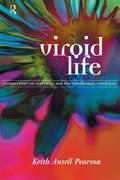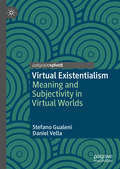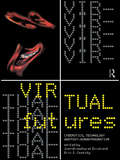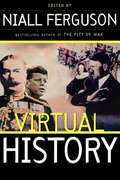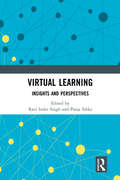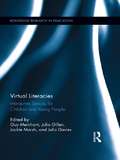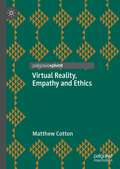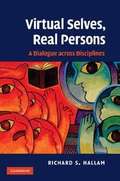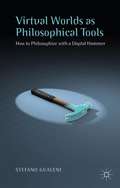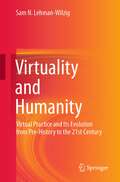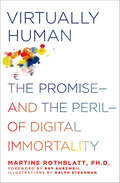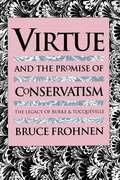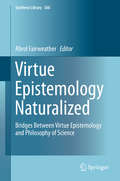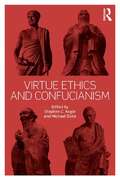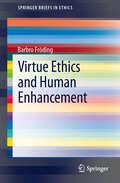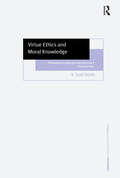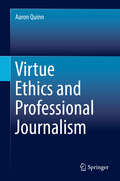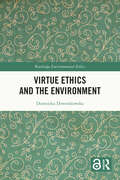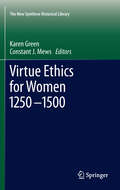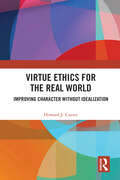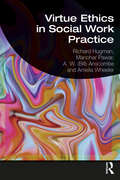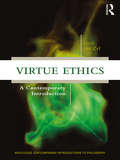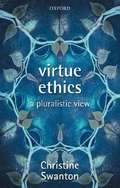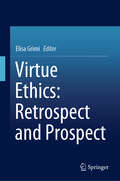- Table View
- List View
Viroid Life: Perspectives on Nietzsche and the Transhuman Condition
by Keith Ansell PearsonNietzsche's vision of the 'overman' continues to haunt the postmodern imagination. His call that 'man is something that must be overcome' can no longer be seen as simple rhetoric. Our experiences of the hybrid realities of artificial life have made the 'transhuman' a figure that looks over us all. Inspired by this vision, Keith Ansell Pearson sets out to examine if evolution is 'out of control' and machines are taking over.In a series of six fascinating perspectives, he links Nietzsche's thought with the issues at stake in contemporary conceptions of evolution from the biological to the technological. Viroid Life; Perspectives on Nietzsche and the Transhuman Condition considers the hybrid, 'inhuman' character of our future with the aid of Nietzsche's philosophy. Keith Ansell Pearson contrasts Nietzsche and Darwin before introducing the more recent figures such as Giles Deleuze and Guy Debord to sketch a new thinking of technics and machines and stress the ambiguous character of our 'machine enslavement'.
Virtual Existentialism: Meaning and Subjectivity in Virtual Worlds
by Stefano Gualeni Daniel VellaThis book explores what it means to exist in virtual worlds. Chiefly drawing on the philosophical traditions of existentialism, it articulates the idea that — by means of our technical equipment and coordinated practices — human beings disclose contexts or worlds in which they can perceive, feel, act, and think. More specifically, this book discusses how virtual worlds allow human beings to take new perspectives on their values and beliefs, and explore previously unexperienced ways of being. Virtual Existentialism will be useful for scholars working in the fields of philosophy, anthropology, media studies, and digital game studies.
Virtual Futures: Cyberotics, Technology and Posthuman Pragmatism
by Joan Broadhurst Dixon Eric J. CassidyVirtual Futures explores the ideas that the future lies in its ability to articulate the consequences of an increasingly synthetic and virtual world. New technologies like cyberspace, the internet, and Chaos theory are often discussed in the context of technology and its potential to liberate or in terms of technophobia. This collection examines both these ideas while also charting a new and controversial route through contemporary discourses on technology; a path that discusses the material evolution and the erotic relation between humans and machines. Virtual Futures brings together diverse fields such as cyberfeminism, materialist philosophy, postmodern fiction, computing culture and performance art, with essays by Sadie Plant, Stelarc and Manuel de Landa (to name a few). The collection heralds the death of humanism and the ride of posthuman pragmatism. The contested zone of debate throughout these essays is the notion of the posthuman, or the possibility of the cyborg as the free human. Viewed by some writers as a threat to human life and humanism itself, others in the collection describe the posthuman as a critical perspective that anticipates the next step in evolution: the integration or synthesis of humans and machines, organic life and technology. This view of technology and information is heavily influenced by Anglo American literature, especially cyberpunk, Pynchon and Ballard, as well as the materialist philosophies of Freud, Deleuze, and Haraway, Virtual Futures provides analyses by both established theorists and the most innovative new voices working in conjunction between the arts and contemporary technology.
Virtual History: Alternatives and Counterfactuals
by Niall FergusonWhat if there had been no American War of Independence? What if Kennedy had lived? These are some of the questions "answered" in "Virtual History", which provides intriguing, far-reaching answers to these questions.
Virtual Learning: Insights and Perspectives
by Ravi Inder Singh Pooja SikkaThis book brings together the research work conducted by renowned academics and practitioners on critical and immensely important issues of virtual learning. It provides innovative ideas and empirical findings on the subject. The sixteen chapters by established and young scholars from all over the country offer strong theoretical and analytical discussion, and examine a wide range of issues confronting the education sector in India in general and the higher education sector in particular. The book seeks to address pertinent issues relating to virtual learning like emerging scenario with respect to required changes in pedagogy used in higher education learning, perceptions of learners about online mode of learning, problems and challenges in virtual learning, paradigm shifts in higher education, designing of new learning strategies for online mode of learning and about the role virtual learning plays in inclusive growth. The scholarly discussion of the book will serve as an excellent vade mecum for readers who want to understand the various dimensions of virtual learning, specifically those that emerged during the Covid-19 Pandemic period, and will provide opportunities to researchers to use it as reference to pursue research in the field of virtual learning.
Virtual Literacies: Interactive Spaces for Children and Young People (Routledge Research in Education #84)
by Julia Gillen Jackie Marsh Guy Merchant Julia DaviesThe growth of interest in virtual worlds and other online spaces for children and young people raises important issues for literacy educators and researchers. This book is a timely and much-needed collection of current research in the area. It provides a synthesis of knowledge and understanding and will be a key resource for scholars, students and teachers, particularly those interested in digital literacies. The work presents a coherent vision of current knowledge, and some of the most engaging, empirical research being undertaken on virtual worlds and online spaces in and beyond educational institutions. It contains international studies from the UK, North America and Australasia. This is an important time for those researching virtual worlds, videogaming and Web 2.0 technologies, since there is growing professional interest in their significance in the education and development of children and young people. Whether these technologies are solely associated with informal learning or whether they should be incorporated into classroom contexts is hotly debated. This book provides a principled evaluation and appreciation of the learning, teaching and instruction that can occur in digital environments, showing children, young people and those who work with them as active agents with possibilities to navigate new paths.
Virtual Reality, Empathy and Ethics
by Matthew CottonThis book examines the ethics of virtual reality (VR) technologies. New forms of virtual reality are emerging in society, not just from low-cost gaming headsets, or augmented reality apps on phones, but from simulated “deep fake” images and videos on social media. This book subjects the new VR technological landscape to ethical scrutiny: assessing the benefits, risks and regulatory practices that shape it. Though often associated with gaming, education and therapy, VR can also be used for moral enhancement. Journalists, artists, philanthropic and non-governmental organisations are using VR films, games and installations to stimulate user empathy to marginalised peoples through a combination of immersion, embodiment and persuasion. This book critically assesses the use of VR for empathy arousal and pro-social behaviour change, culminating in the development of a VR “ethical tool” – a device to facilitate reflective ethical judgement. Drawing upon the pragmatist philosophy of John Dewey, virtual reality is reshaped as “dramatic rehearsal”. This book explains how a combination of immersive environment-building, moral imagination, choice architecture and reflective engagement can stimulate a future-focused and empathic ethics for users of the technology.
Virtual Selves, Real Persons
by Richard S. HallamHow do we know and understand who we really are as human beings? The concept of 'the self' is central to many strands of psychology and philosophy. This book tackles the problem of how to define persons and selves and discusses the ways in which different disciplines, such as biology, sociology and philosophy, have dealt with this topic. Richard S. Hallam examines the notion that the idea of the self as some sort of entity is a human construction and, in effect, a virtual reality. At the same time, this virtual self is intimately related to the reality of ourselves as biological organisms. Aiming to integrate a constructionist understanding of self with the universalizing assumptions that are needed in natural-science approaches, this text is unique in its attempt to create a dialogue across academic disciplines, while retaining a consistent perspective on the problem of relating nature to culture.
Virtual Worlds As Philosophical Tools
by Stefano Gualeni• What does it mean for human beings to 'be' in simulated worlds? • Will experiencing worlds that are not 'actual' change our ways of structuring thought? • Can virtual worlds open up new possibilities to philosophize? Inspired by Martin Heidegger's work,Virtual Worlds as Philosophical Tools seeks to answer these questions from a perspective that combines insights from the field of philosophy of technology with videogame design. Gualeni's exploration casts new light on interactive digital simulations as the context in which a new humanism has already begun to arise. From that perspective, this book articulates an understanding of virtual worlds as philosophical mediators.
Virtuality and Humanity: Virtual Practice and Its Evolution from Pre-History to the 21st Century
by Sam N. Lehman-WilzigThis is a pioneering study of virtuality through human history: ancient-to-modern evolution and recent expansion; expression in many fields (chapters on Religion; Philosophy, Math, Physics; Literature and the Arts; Economics; Nationhood, Government and War; Communication); psychological and social reasons for its universality; inter-relationship with "reality." The book's thesis: virtuality was always an integral part of humanity in many areas of life, generally expanding over the ages. The reasons: 1- brain psychology; 2- virtuality's six functions — escape from boredom to relieving existential dread. Other questions addressed: How will future neuroscience, biotech and "compunications" affect virtuality? Can/should there be limits to human virtualizing?
Virtually Human: The Promise—and the Peril—of Digital Immortality
by Martine RothblattVirtually Human explores what the not-too-distant future will look like when cyberconsciousness—simulation of the human brain via software and computer technology—allows our consciousness to be present forever.Meet Bina48, the world's most sentient robot, commissioned by Martine Rothblatt and created by Hanson Robotics. Bina48 is a nascent Mindclone of Martine's wife that can engage in conversation, answer questions, and even have spontaneous thoughts that are derived from multimedia data in a Mindfile created by the real Bina. If you're active on Twitter or Facebook, share photos through Instagram, or blogging regularly, you're already on your way to creating a Mindfile—a digital database of your thoughts, memories, feelings, and opinions that is essentially a back-up copy of your mind. Soon, this Mindfile can be made conscious with special software—Mindware—that mimics the way human brains organize information, create emotions and achieve self-awareness. This may sound like science-fiction A.I. (artificial intelligence), but the nascent technology already exists. Thousands of software engineers across the globe are working to create cyberconsciousness based on human consciousness and the Obama administration recently announced plans to invest in a decade-long Brain Activity Map project. Virtually Human is the only book to examine the ethical issues relating to cyberconsciousness and Rothblatt, with a Ph.D. in medical ethics, is uniquely qualified to lead the dialogue.
Virtue And The Promise Of Conservatism: The Legacy Of Burke And Tocqueville
by Bruce FrohnenOften loud and acrimonious, the public tug-of-war between a reinvigorated conservatism and a liberalism in apparent disarray has obscured an equally important competition-that among conservatives themselves. <p><p> In Virtue and the Promise of Conservatism, Bruce Frohnen joins the fray in an effort to rescue the essence of conservative virtue from rationalists and materialists of whatever political stripe. He argues that we have "lost and must attempt to regain the conservative good life and the outlook which made it possible." The tools needed to do that, according to Frohnen, are humility and—yes—political action aimed at combatting the centralizing and materialistic structures and beliefs interfering with the formation and retention of family, church, and neighborhood. <p> Drawing deeply from the writings of Edmund Burke and Alexis de Tocqueville, both critics of untempered reason and "the drive toward a spiritually impoverished egalitarian materialism," Frohnen explores how their work has influenced individuals as diverse as traditionalist Russell Kirk, "apocalyptic" libertarian Michael Oakeshott, and neoconservative Irving Kristol. <p> While differing greatly in their views and prescriptions, these contemporary conservatives, Frohnen shows, are nevertheless united in their desire to preserve the local community's natural and fundamental institutions. This preservation, he argues, requires a renewed faith in and humble acceptance of the essential good contained within these institutions.
Virtue Epistemology Naturalized
by Abrol FairweatherThis book presents four bridges connecting work in virtue epistemology and work in philosophy of science (broadly construed) that may serve as catalysts for the further development of naturalized virtue epistemology. These bridges are: empirically informed theories of epistemic virtue; virtue theoretic solutions to under determination; epistemic virtues in the history of science; and the value of understanding. Virtue epistemology has opened many new areas of inquiry in contemporary epistemology including: epistemic agency, the role of motivations and emotions in epistemology, the nature of abilities, skills and competences, wisdom and curiosity. Value driven epistemic inquiry has become quite complex and there is a need for a responsible and rigorous process of constructing naturalized theories of epistemic virtue. This volume makes the involvement of the sciences more explicit and looks at the empirical aspect of virtue epistemology. Concerns about virtue epistemology are considered in the essays contained here, including the question: can any virtue epistemology meet both the normativity constraint and the empirical constraint? The volume suggests that these worries should not be seen as impediments but rather as useful constraints and desiderata to guide the construction of naturalized theories of epistemic virtue.
Virtue Epistemology Naturalized: Bridges Between Virtue Epistemology and Philosophy of Science (Synthese Library #366)
by Abrol FairweatherThis book presents four bridges connecting work in virtue epistemology and work in philosophy of science (broadly construed) that may serve as catalysts for the further development of naturalized virtue epistemology. These bridges are: empirically informed theories of epistemic virtue; virtue theoretic solutions to under determination; epistemic virtues in the history of science; and the value of understanding.Virtue epistemology has opened many new areas of inquiry in contemporary epistemology including: epistemic agency, the role of motivations and emotions in epistemology, the nature of abilities, skills and competences, wisdom and curiosity.Value driven epistemic inquiry has become quite complex and there is a need for a responsible and rigorous process of constructing naturalized theories of epistemic virtue. This volume makes the involvement of the sciences more explicit and looks at the empirical aspect of virtue epistemology.Concerns about virtue epistemology are considered in the essays contained here, including the question: can any virtue epistemology meet both the normativity constraint and the empirical constraint? The volume suggests that these worries should not be seen as impediments but rather as useful constraints and desiderata to guide the construction of naturalized theories of epistemic virtue.
Virtue Ethics and Confucianism
by Stephen C. Angle Michael SloteThis volume presents the fruits of an extended dialogue among American and Chinese philosophers concerning the relations between virtue ethics and the Confucian tradition. Based on recent advances in English-language scholarship on and translation of Confucian philosophy, the book demonstrates that cross-tradition stimulus, challenge, and learning are now eminently possible. Anyone interested in the role of virtue in contemporary moral philosophy, in Chinese thought, or in the future possibilities for cross-tradition philosophizing will find much to engage with in the twenty essays collected here.
Virtue Ethics and Human Enhancement
by Barbro FrödingThis book shows how pressing issues in bioethics - e.g. the ownership of biological material and human cognitive enhancement - successfully can be discussed with in a virtue ethics framework. This is not intended as a complete or exegetic account of virtue ethics. Rather, the aim here is to discuss how some key ideas in Aristotle's Nicomachean Ethics, when interpreted pragmatically, can be a productive way to approach some hot issues in bioethics. In spite of being a very promising theoretical perspective virtue ethics has so far been underdeveloped both in bioethics and neuroethics and most discussions have been conducted in consequentialist and/or deontological terms.
Virtue Ethics and Moral Knowledge: Philosophy of Language after MacIntyre and Hauerwas (Ashgate New Critical Thinking in Philosophy)
by R. Scott SmithWe live in a time of moral confusion: many believe there are no overarching moral norms, and we have lost an accepted body of moral knowledge. Alasdair MacIntyre addresses this problem in his much-heralded restatement of Aristotelian and Thomistic virtue ethics; Stanley Hauerwas does so through his highly influential work in Christian ethics. Both recast virtue ethics in light of their interpretations of the later Wittgenstein's views of language. This book systematically assesses the underlying presuppositions of MacIntyre and Hauerwas, finding that their attempts to secure moral knowledge and restate virtue ethics, both philosophical and theological, fail. Scott Smith proposes alternative indications as to how we can secure moral knowledge, and how we should proceed in virtue ethics.
Virtue Ethics and Professional Journalism
by Aaron QuinnThis book examines the moral role of news media practitioners and organizations, and applies a modified philosophical account of Virtue Ethics as a framework for the role of journalists—and journalism organizations—in public life. It shows how journalists and news organizations that adopt an aim towards professional excellence (virtue) by putting a premium on investigative journalism—with both large and small measures depending on the nature of the reporting—can achieve lofty professional goals under modern deadlines. The news media, both electronic and traditional, are imperative to an informed public, and an informed public is critical to a properly functioning cross-section of social, government and corporate domains. The book emphasizes the virtues of justice and integrity as foundational to professional practice. It examines the modern ethical challenges presented by organizations ranging from online upstarts to massive media conglomerates, each that have economic challenges that can inhibit professional excellence through corruption or corrosion. The author applies his account of virtue—bolstered by suggestions for complementary reforms in education and regulation—to improve an ethically challenged industry as it undergoes significant technological change.
Virtue Ethics and the Environment (Routledge Environmental Ethics)
by Dominika DzwonkowskaThis book addresses one of today’s most burning issues, namely the environmental crisis, by offering an insight into the problem from the perspective of virtue ethics.Virtue ethics is an approach to ethics that centralizes the concept of moral virtue, which can be extended to environmental ethics via environmental virtue ethics (EVE). Beginning with a comprehensive overview, the book explores the renaissance of contemporary virtue ethics and the beginnings of EVE in the second half of the 20th century and presents the main characteristics, proponents, and criticisms of EVE. The book then goes on to analyze its development by distinguishing the three most influential concepts: the classical; the naturalistic, teleological, and pluralistic; and the narrative conception of environmental virtue ethics. The author also discusses the most influential works on EVE, including a revision of Louke van Wensveen’s postulate to use virtue language in environmental ethics. By synthesizing such works on EVE alongside an analysis of the three most important concepts, the book offers a new concept that is universalistic, positive, and pragmatic.The book will be useful for students, scholars, and researchers studying environmental ethics, sustainable development, environmental psychology, moral philosophy, and philosophy of education.
Virtue Ethics for Women 1250-1500
by Karen Green Constant MewsThis book locates Christine de Pizan's argument that women are virtuous members of the political community within the context of earlier discussions of the relative virtues of men and women. It is the first to explore how women were represented and addressed within medieval discussions of the virtues. It introduces readers to the little studied Speculum Dominarum (Mirror of Ladies), a mirror for a princess, compiled for Jeanne of Navarre, which circulated in the courtly milieu that nurtured Christine. Throwing new light on the way in which Medieval women understood the virtues, and were represented by others as virtuous subjects, it positions the ethical ideas of Anne of France, Laura Cereta, Marguerite of Navarre and the Dames de la Roche within an evolving discourse on the virtues that is marked by the transition from Medieval to Renaissance thought. Virtue Ethics for Women 1250-1500 will be of interest to those studying virtue ethics, the history of women's ideas and Medieval and Renaissance thought in general.
Virtue Ethics for the Real World: Improving Character without Idealization
by Howard J. CurzerIn Virtue Ethics for the Real World: Improving Character without Idealization, Howard J. Curzer argues that character ideals seduce virtue ethicists into counterintuitive claims, mislead and psychologically harm people seeking to improve their characters, and sometimes become tools for exploitation. Curzer offers a theory of Aristotelian virtue ethics that eschews idealization and that harmonizes with common sense. To explain the many dilemmas of ordinary life, he allows that different virtues sometimes enjoin incompatible actions and even enjoin actions that conflict with duty. Curzer defends the doctrine of the mean, arguing that idealized traits such as unilateral forgiveness, universal civility, unconditional commitments, and unlimited generosity are not virtues. He shows that the reciprocity of virtues doctrine depends upon idealization and rejects it. When undergirding his theory, Curzer wears several hats. He is a eudaimonist when grounding virtue, a constructivist when grounding value, and a perspectivist (a la Nietzsche) when grounding virtuous action. How can people improve without aiming at an ideal? Curzer offers an individualized approach to character improvement modeled on contemporary medicine. First, diagnose each person’s character flaws. Then tailor treatment plans to each flaw. An important tool is a fine-grained table of the components of character, their failure modes, and corresponding therapies. Curzer provides the beginnings of such a table.
Virtue Ethics in Social Work Practice
by Manohar Pawar Richard Hugman A. W. Anscombe Amelia WheelerUsing evidence from research with practitioners, integrated with wider material about virtue ethics in the helping professions, this book explores important types of virtue that are central to developing and sustaining excellence in social work. Comprised of ten chapters and drawing on extensive research with social workers as well as wider debates and analysis, the discussion carefully concentrates on everyday experiences and achievements. This approach enables the book to avoid an idealized and prescriptive approach by making clear that virtues vary between contexts and individuals, while at the same time clearly marking out qualities and characteristics of social work that are foundational to the development of practitioners and of the profession as a whole. It will be required reading for students on all BSc/BSW and MSc/MSW courses on professional ethics or preparation for practice. It will also be of interest to practitioners in other professions, including human services, health, education and social development or development studies.
Virtue Ethics: A Contemporary Introduction (Routledge Contemporary Introductions to Philosophy)
by Liezl Van ZylThis volume provides a clear and accessible overview of central concepts, positions, and arguments in virtue ethics today. While it focuses primarily on Aristotelian virtue ethics, it also includes discussion of alternative forms of virtue ethics (sentimentalism and pluralism) and competing normative theories (consequentialism and deontology). The first six chapters are organized around central questions in normative ethics that are of particular concern to virtue ethicists and their critics: What is virtue ethics? What makes a trait a virtue? Is there a link between virtue and happiness? What is involved in being well-motivated? What is practical wisdom? What makes an action right? The last four chapters focus on important challenges or objections to virtue ethics: Can virtue ethics be applied to particular moral problems? Does virtue ethics ultimately rely on moral principles? Can it withstand the situationist critique? What are the prospects for an environmental virtue ethics? ?
Virtue Ethics: A Pluralistic View
by Christine SwantonChristine Swanton offers a new, comprehensive theory of virtue ethics which addresses the major concerns of modern ethical theory from a character-based perspective. Discussion of many problems in moral theory, such as moral constraints, rightness of action, the good life, the demandingness of ethics, the role of the subjective, and the practicality of ethics, has been dominated by Kantian and Consequentialist theories, with their own distinctive conceptual apparatus. Virtue Ethics shows how a different framework can shed new light on these intractable issues. Swanton's approach is distinctive in departing in significant ways from classical versions of virtue ethics derived primarily from Aristotle. Employing insights from Nietzsche and other sources, she argues against both eudaimonistic virtue ethics and traditional virtue ethical conceptions of rightness. In developing a pluralistic view, she shows how different modes of moral acknowledgement' such as love, respect, appreciation, and creativity, are embedded in the very fabric of virtue, the moral life, and the good life.
Virtue Ethics: Retrospect and Prospect
by Elisa GrimiThe rise of the phenomenon of virtue ethics in recent years has increased at a rapid pace. Such an explosion carries with it a number of great possibilities, as well as risks. This volume has been written to contribute a multi-faceted perspective to the current conversation about virtue. Among many other thought-provoking questions, the collection addresses the following: What are the virtues, and how are they enumerated? What are the internal problems among ethicists, and what are the objections and replies to contemporary virtue ethics? Additionally, the practical implications following from the answers to these questions are discussed in new and fascinating research. Fundamental concepts such as teleology and eudaimonism are addressed from both a historical and dialectical approach. This tome will contribute not only to providing further clarity to the current horizons in virtue ethics, but also to the practical conclusion following from the study: to challenge the reader toward a greater pursuit of the virtuous life.
